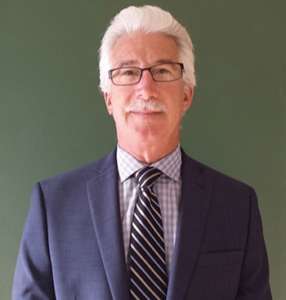

New Hampshire CIO Denis Goulet recounted his state's unique governing environment, his invaluable advisory board, 2019 IT priorities and his future without his...
New Hampshire Chief Information Officer Denis Goulet said that, in retrospect, youth sports can teach valuable lessons for individuals in his position.
“I’ll tell you refereeing soccer is scary because you’re in that position where a bad decision can affect the outcome of the match. So that’s very similar to a CIO,” he said. “If sometimes you’re looking at a set of issues. I have two or three options, none of which are really great options. It’s which one do we choose, and how do we manage that option. So there are some parallels there for sure.”
Goulet felt that being a soccer official helped him make clear, crisp and justifiable decisions quickly. He also admitted he lacked the patience or demeanor to be a coach.
Goulet related how New Hampshire shares a rather unusual distinction with neighboring Vermont — the only two states that elect their governors for two-year terms.
“It does create a never ending cycle because the governor is always in campaign mode and a lot of what’s going on is more immediately colored by the political activities that may be occurring,” Goulet said.

This can have a significant impact on the CIO position appointment process and term of service. But unlike Vermont, New Hampshire is unique in that while the governor has only a two year term, the cabinet members — commissioners, as they are called in the Granite State — are appointed by the governor to four year terms.
“The appointments are considered contracts so that a change in governor does not imply a change in position. So when Gov. Chris Sununu was elected a couple of years ago for his first term, I was a couple of years in. I still had two and a half years left on my four-year term,” he said. “That’s unique in New Hampshire. It provides a lot of continuity in the senior positions in government.”
His appointment in 2015 added more color to our discussion. Some state CIO’s still rise up through the IT ranks of bureaucracy, though this route is less common today.
However, now that every state CIO is appointed by their governor, according to National Association of State Chief Information Officers (NASCIO ) Executive Director Doug Robinson, most come from outside. They are either from another government entity or, as is most often the case, the private sector.
Goulet hails from the latter, and his appointment, shall we say, had an unconventional twist.
It wasn’t the proverbial nationwide search, however, he did single out for special mention a couple folks who aided him along the way. One was a rather conventional ally in these processes: His congressman. The other, perhaps less so, was his mother.
“I worked with our executive councilor, now congressman, Chris Pappas. He helped get my resume in front of Gov. Maggie Hasson,” Goulet said. “It also turned out that my mom is a political activist in New Hampshire, and if you’re a Democratic woman running for office, she’s probably going to help you. And so Maggie’s chief of staff, Pam Walsh, she used to laugh at me because she said basically even at my age my mother got me a job.”
Regardless of the familial reference, Goulet wasted little time reappraising the CIO role in the state and determining that a cultural shift was necessary. He felt that in the past New Hampshire IT leadership had been inaccessible and often misunderstood.
“So I get out continuously. I’m always in front of state leaders. I’m trying to talk to them about what they care about, understanding the business of the state, and helping them understand what we’re doing and building those collaborative relationships,” he said.
Now getting out in front of New Hampshire state leaders, especially legislators, is no small task. It’s the largest state legislature in the U.S. with 400 state representatives and 24 state senators.
In addition, these legislators are also the lowest paid earning $100 a year. For comparison, California legislators receive annual salary of more than $100,000 plus a tax free $175 per diem over roughly 200 session days per year. They earn $100 an hour!
With such vast audience Goulet explained that he had to prioritize, to identify the leadership in both the executive branch and the legislature, and take his message to them.


“We use them as our policy and strategy development mechanism. And in consultation with the IT Council, the Department of Information Technology can create and enforce policy,” he said. “So really I have the strength of law behind me and it really is a powerful organization. I’m using it as a mechanism to drive policy and strategy inside the state in an intelligent and transparent way.”
I had to add my personal fascination with these types of organizations, with which I worked both in California and Massachusetts. I once gave a presentation at an IT conference with the somewhat provocative title, “IT Advisory Boards – The composition of their membership, how to craft their assigned duties and jurisdiction, how to make them productive, and how to make sure they don’t become a pain in the butt.” (I don’t think I used that last word though.)
Goulet and I both agreed that properly managed boards of directors can be very valuable, and sometimes can be the “bad cop” to actually promulgate actions the CIO alone may not be able to.
Looking at the new year and a new budget in the works New Hampshire has several IT priorities worthy of note involving citizen service, governance and cybersecurity. Goulet explained that Hasson and now Sununu, though very distinct governors from different political parties, shared a passion for customer service.
“We have a digital government initiative, as do most states and we’re trying to work on improving how we address the needs of our citizens and businesses inside the state through well thought out digital government,” he said.
Goulet emphasized that he continues to spend significant effort on governance including portfolio management, creating a virtual project management office to advance consistent and solid project management throughout the state; through business relationship management and alignment, and through performance management and organizational development inside his department to ensure everybody is performing at their highest level.
Not surprising though, like governments and businesses everywhere, cybersecurity is the primary state IT concern.
“It has been in NASCIO’s top 10 CIO priorities for many years. And it’s no different in New Hampshire,” he said. “We continue to work on both protecting the data as well as thinking forward to how we advance our capabilities so that we’re less vulnerable as the world changes.”
What’s next for Goulet? He still has a few months left before his term ends this May, but he has already advised his newly re-elected boss Sununu that he would like to stay.
I hope he does but unfortunately, the governor being a Republican, his mother may not have the same influence this time around.
Copyright © 2025 Federal News Network. All rights reserved. This website is not intended for users located within the European Economic Area.
